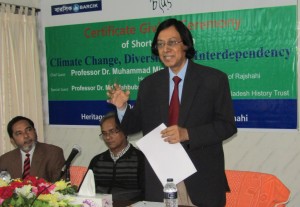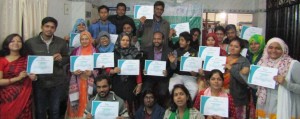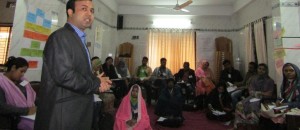By Bahauddin Bahar
Global warming and climate change is most important and discursive issue globally. Bangladesh is more vulnerable to climate change due to its geophysical location and economic condition. Climate change as well as human unplanned interference has been one the reasons for the decline and lost interrelation and interdependent relationship among humans, plants and other living and non-living subjects and objects. However, to revive the interrelation and increase interdependent relationship among humans, plants and other elements of the nature awareness among people and study and research to unveil to cause of lost interrelation and interdependent relationship is needed. Bearing this mind and with the objective to familiarize, educate and inform the new generation regarding the importance of interdependency and diversity BIAS has just completed its 10 days certificate course on “Climate Change, Diversity and Interdependency” with the help of Student Union of University of Helsinki. The course which took place at Heritage: Archives of Bangladesh History Trust, Kazla Rajshahi started from 1st December and ended on 10 December, 2016. The Course was inaugurated by Parvez Raihan, Addition District Commissioner (Education & ICT), Rajshai.
Course was especially designed for Rajshai; which is known as Barendra region. It has unique geographical characteristics. The impacts of climate change are clearly visible in agriculture, livelihood and environmental patterns of this region as well. It is believed that in order to mitigate as well as invent the adaptive techniques to climate change the youth of this region could play a vital role. From this backdrop, the course was designed to educate, inform and motivate them playing their parts to fight with climate change impacts.
The course which aimed to unlock the potentiality as well as make the youth active and responsive towards changes in their perspective areas was escorted by 23 participants 8 educational institutes of Rajshai and Chapai Nawabganj districts. Among them 13 are female and 10 are male. The participants are also from different disciplines i.e. e from 14 different subjects. Besides, most of them are graduation and post -graduation level students along with t 5 part-time service holders.
Nonetheless, 9 faculties such as dept. of Anthropology, University of Rajshahi and BARCIK and BIAS took part in 14 different sessions within 6 themes in this course. The themes include: Introduction to Climate Change and related Terminology, Climate Change and Vulnerable Groups, Climate Change and Relation with Nature, Climate Change: Indigenous Knowledge, Climate Change and Development, Climate Change: Youth Roles.
During the 10 days course participants did 2-days field works to experience and practically learn climate change and its impact from natural resources dependent community including theoretical discussions. The participants also practiced social research tools and techniques during the course to sharpen their skills on research.
As soon as the theoretical and practical parts of the course ended BIAS requested individual research proposal from the participants. BIAS after properly screening the proposals will provide scholarship and guideline to the participants to conduct their research works whose proposals have been selected. 
The closing session of the course was held by giving certificates to participants who successfully completed the course. Professor Dr. Muhammad Mizanuddin, Hon’ble Vice Chancellor, University of Rajshahi attended in the closing ceremony as chief guest. On the other hand, Professor Dr. Mahbubur Rahman, Chairman, Heritage: Archives of Bnagladesh History Trust attended as special guest and Executive Director of BARCIK Mr. Sukanta Sen, attended as Chair. Besides, BIAS honored chief guest and special guest with crest as a token of thanks.
It is to mention that the main achievement of this course is commitment of participants for fighting with climate change impacts through playing active roles taking appropriate initiatives of their own and changing their attitudes.
Edited by Silvanus Lamin


